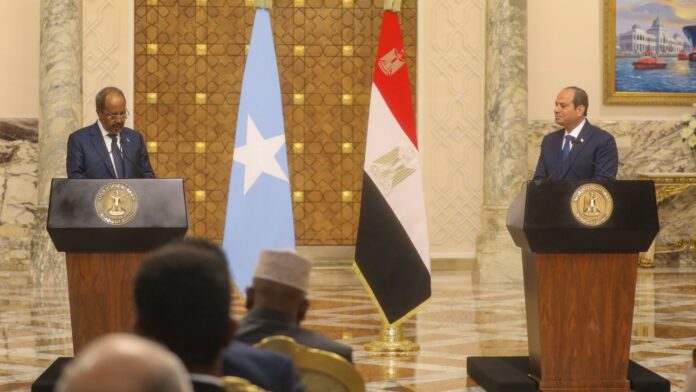On August 14, 2024, Somali President Hassan Sheikh Mohamud and Egyptian President Abdel Fattah al-Sisi discussed the regional situation. The two presidents formalised a defence pact signed by both ministers of defence (Mohamed Saki and Abdulkadir Mohamed), aimed at strengthening security cooperation between their two nations. This is the second time President Mohamud has visited Cairo since tensions between Somalia and Ethiopia emerged, related to a Memorandum of Understanding (MOU). The Cairo-Mogadishu agreement was the culmination of extensive diplomatic engagement, reflecting both countries’ strategic interests in enhancing their regional influence. The timing of this pact is particularly notable, as it follows Ethiopia’s controversial MOU with Somaliland, which granted Ethiopia access to the port on a 50-year lease, enabling it to establish a naval base along the Red Sea coast and the lack of results of the talks organised by the Turkish mediation on 12 August in Ankara.
Somalia views Ethiopia’s agreement with Somaliland as an infringement on its sovereignty. This situation has pushed Somalia to seek external support to counterbalance Ethiopian intervention. Egypt and Somalia have a long history of alliance, and both countries have grievances with Ethiopia. In the 1962 and 1977 wars between Ethiopia and Somalia, Egypt sided with Somalia both times. Egypt, with its own set of grievances against Ethiopia, particularly over the Grand Ethiopian Renaissance Dam (GERD), has found in Somalia a willing ally to push back against Ethiopia’s expanding regional ambitions.
The relationship between Egypt and Ethiopia has been historically fraught with tension, primarily revolving around the Nile River, which is a critical water source and geopolitical alignments versus Israel and the Cold War protagonists. Egypt claims to respect the 1929 agreement that gives it exclusive rights to utilise Nile waters. The construction of the GERD, which began in 2011 under the leadership of Meles Zenawi, has been a significant point of contention. Egypt fears that the dam will reduce its share of Nile waters, essential for its agriculture and overall survival. Despite numerous rounds of negotiations, the two countries have been unable to reach a comprehensive agreement on the management of the Nile’s resources.
Tensions have escalated over the years, with both countries engaging in diplomatic and, at times, military posturing. Egypt has sought to internationalise the dispute, bringing it before the United Nations and other multilateral organisations, while Ethiopia has insisted on its right to utilise its natural resources to support its development goals. This historical context provides the backdrop against which Egypt’s motive in the recent defence pact with Somalia can be understood. Egypt also signed military cooperation agreements with South Sudan and has a long history of military cooperation with Sudan.
Egypt’s primary motive in signing the defence pact with Somalia is to strengthen its strategic position in the Horn of Africa and counter Ethiopia’s influence. By aligning with Somalia, Egypt gains a foothold in a region critical to the security of the Gulf of Aden—a vital maritime route for global trade, including Egyptian exports and imports. Furthermore, the pact serves as a direct response to Ethiopia’s naval aspirations in the Red Sea, potentially disrupting Ethiopia’s plans by ensuring that Egypt and its allies have a say in regional security matters. It also allows Egypt to contest the role of pivotal state in the Horn that the USA and UK have attributed to Ethiopia over the last two decades. Furthermore, it indicates to the Gulf States that Egypt -despite its economic predicament- still is a stakeholder in Horn of Africa affairs.
Moreover, Egypt’s involvement in Somalia can be seen as part of a broader strategy to exert pressure on Ethiopia over the GERD issue. By supporting Somalia, Egypt aims to create a coalition of states that are either directly or indirectly opposed to Ethiopia’s regional dominance, thus isolating Addis Ababa diplomatically.
The specifics of the military pact between Somalia and Egypt remain unclear, as the detailed terms of mutual defence have not yet been presented to both cabinets. To date, there has been no comprehensive disclosure or discussion about the agreement within the government. This lack of clarity has raised concerns in Ethiopia.
For Somalia, the defence pact with Egypt provides much-needed security guarantees at a time when its territorial integrity is under threat, given the weakness of the Somali Federal Government (SFG). The Ethiopian agreement with Somaliland is perceived by Somalia as a direct challenge to its unity and sovereignty. By partnering with Egypt, Somalia not only gains a powerful ally in its dispute with Ethiopia but also secures diplomatic more than military assistance that could be crucial in deterring further intrusions. The treaty with Egypt is a way to curb the influence of the UAE that is somewhat supportive of the MoU for its own reasons, among Arab countries. Egypt would unlikely enter any armed conflict with Ethiopia because of Somalia. However, diplomatically, Egypt can work to isolate Ethiopia.
Additionally, Somalia stands to benefit from Egypt, which has pledged to assist in building Somalia’s military defence. This support is particularly valuable as Somalia continues to struggle with internal security challenges, including the ongoing threat posed by the militant group Al-Shabaab.
There is still a significant question mark on Somalia’s strategy of containment. While its president did everything to get Somalia membership in the East African Community, his diplomacy has never seriously played this card concerning the MoU. It would have been a good stress test for the diplomatic support EAC members should show when the sovereignty of one of its members is threatened. Instead, Mogadishu played the old geopolitical alliances, which may illustrate its lack of strategy in dealing with the MoU.
Further Analysis and Implications
Positive Outcomes
One of the potential positive outcomes of the defence pact is the bolstering of Somalia’s security capabilities. Egypt is eager to enforce such a deal. With Egypt’s support, Somalia could improve its military readiness, better protect its borders, diminish Al-Shabaab threats and defend against external threats.
For Egypt, the pact could enhance its influence in the Red Sea region, securing its strategic interests and potentially leading to a more balanced power dynamic in the region. The alliance could also serve as a diplomatic lever in Egypt’s negotiations with Ethiopia over the GERD, giving Cairo additional bargaining power. Cairo may also use it to negotiate with USA or UK while conditioning the delivery of military hardware to the recognition of its more strategic role in the region.
Negative Outcomes
However, the defence pact also carries significant risks. The most immediate concern is the potential for further escalation of tensions between Somalia and Ethiopia. Ethiopia has already responded negatively to the pact, viewing it as a hostile move that could destabilise the region. If not managed carefully, the situation could lead to an arms race or even military incidents, particularly if Ethiopia feels compelled to assert its influence in Somaliland more forcefully.
Abiy Ahmed’s government is politically unstable, with the country experiencing rebellions and clashes between different nationalities, the Oromo and Amhara or the Afar and the Somali. The TPLF remains concerned as the Pretoria agreement has not yet been finalised, and the OLA continues to engage in skirmishes against the ENDF, indicating that the Arusha agreement has not been effective. The ENDF has also been unable to win its confrontations with FANO. The country is torn apart by ethnic conflicts and is suffering from severe economic hardship. Abiy Ahmed is surrounded by these crises and may not maintain his military presence in Somalia despite willing to participate in the post-ATMIS phase, to ascertain his influence and secure financial support for his military forces. Instead, Egypt has offered to join the ATMIS. This highly raised Ethiopians concern and this might lead to Somalia’s instability to increase much more.
Another potential drawback is the historical hesitation in Somalia regarding Egypt’s endorsement of Banadir politicians during the 1998 Cairo meeting, which led Abdullahi Yusuf and Adan Gabyow to withdraw and instead seek support in Addis Ababa, where Meles Zenawi backed Abdullahi Yusuf in establishing Puntland state. Today, Egypt continues to support Mogadishu, raising the possibility that Puntland might shift its support from Mogadishu to align with Ethiopia. Another tension emerged in parts of Gedo and Bakol, where some officers officially opposed the pact and stated they would side with Ethiopia, potentially leading to instability in Somalia.
This pact could also strain SFG relationships with other regional powers, such as Djibouti and Kenya, which may view the growing Egyptian influence with suspicion. This could lead to a realignment of alliances in the region, further complicating the already complex geopolitical landscape of the Horn of Africa.
Another limitation is that Somalia has military pacts with both Egypt and Turkey. It is unclear how these two pacts will align. If the Egypt agreement includes sending naval military forces to Somalia while Turkey’s navy is operating in Somalia, this might intensify military tension in the Gulf of Aden, with the possibility of Houthi militias instigating conflict.
Author: A.Bari Zaki
Contact info: abdibari311@gmail.com
Twitter X: @BariZaki65
The views expressed in this article belong to the author and do not necessarily reflect the editorial policy of Horn Broadcasting Network.


